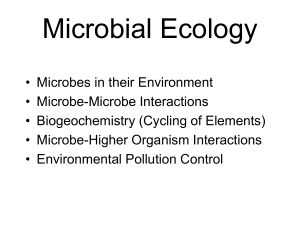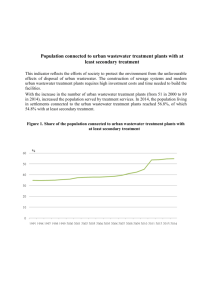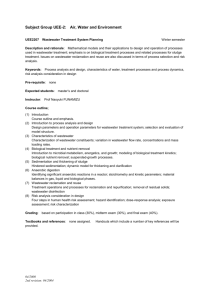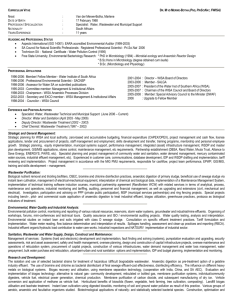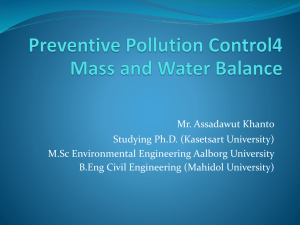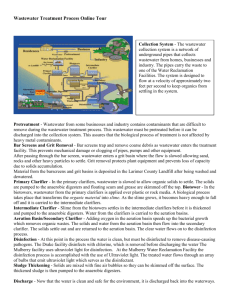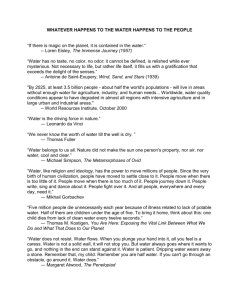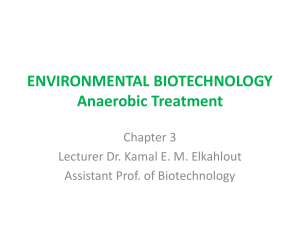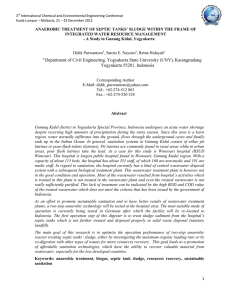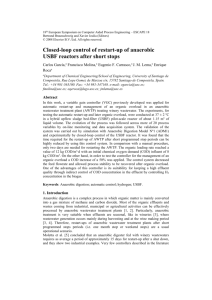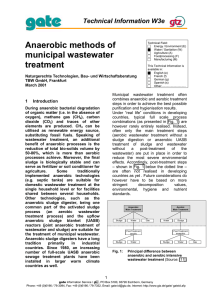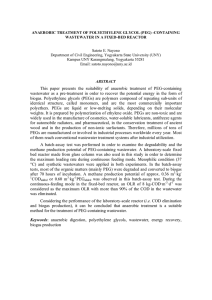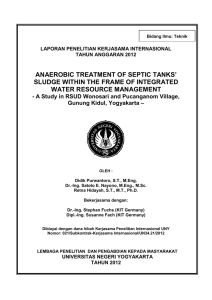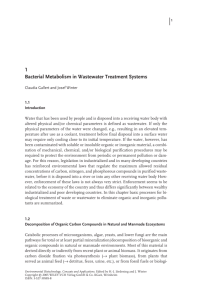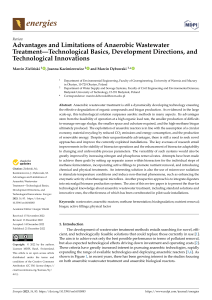BioWET summer school
advertisement
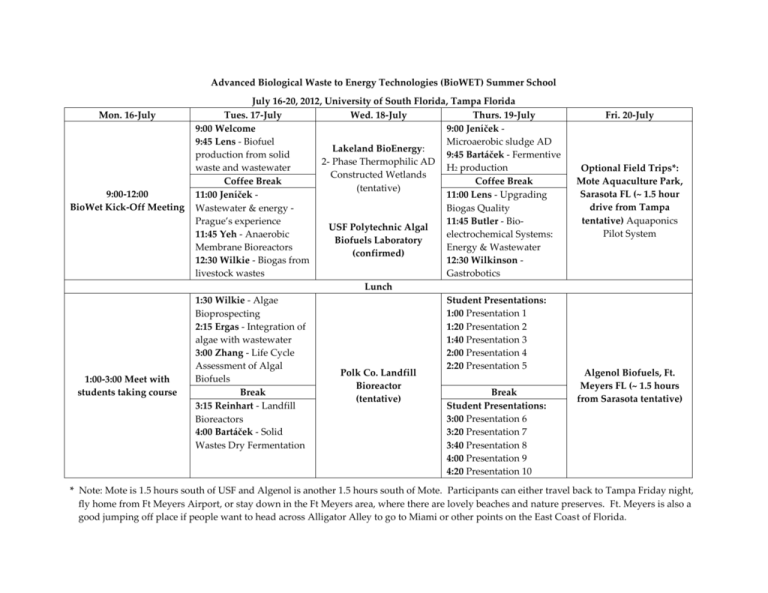
Advanced Biological Waste to Energy Technologies (BioWET) Summer School Mon. 16-July 9:00-12:00 BioWet Kick-Off Meeting 1:00-3:00 Meet with students taking course July 16-20, 2012, University of South Florida, Tampa Florida Tues. 17-July Wed. 18-July Thurs. 19-July 9:00 Welcome 9:00 Jeníček 9:45 Lens - Biofuel Microaerobic sludge AD Lakeland BioEnergy: 9:45 Bartáček - Fermentive production from solid 2- Phase Thermophilic AD waste and wastewater H2 production Constructed Wetlands Coffee Break Coffee Break (tentative) 11:00 Jeníček 11:00 Lens - Upgrading Wastewater & energy Biogas Quality 11:45 Butler - BioPrague’s experience USF Polytechnic Algal 11:45 Yeh - Anaerobic electrochemical Systems: Biofuels Laboratory Membrane Bioreactors Energy & Wastewater (confirmed) 12:30 Wilkie - Biogas from 12:30 Wilkinson livestock wastes Gastrobotics Lunch 1:30 Wilkie - Algae Student Presentations: 1:00 Presentation 1 Bioprospecting 2:15 Ergas - Integration of 1:20 Presentation 2 1:40 Presentation 3 algae with wastewater 3:00 Zhang - Life Cycle 2:00 Presentation 4 2:20 Presentation 5 Assessment of Algal Polk Co. Landfill Biofuels Bioreactor Break Break (tentative) 3:15 Reinhart - Landfill Student Presentations: 3:00 Presentation 6 Bioreactors 4:00 Bartáček - Solid 3:20 Presentation 7 3:40 Presentation 8 Wastes Dry Fermentation 4:00 Presentation 9 4:20 Presentation 10 Fri. 20-July Optional Field Trips*: Mote Aquaculture Park, Sarasota FL (~ 1.5 hour drive from Tampa tentative) Aquaponics Pilot System Algenol Biofuels, Ft. Meyers FL (~ 1.5 hours from Sarasota tentative) * Note: Mote is 1.5 hours south of USF and Algenol is another 1.5 hours south of Mote. Participants can either travel back to Tampa Friday night, fly home from Ft Meyers Airport, or stay down in the Ft Meyers area, where there are lovely beaches and nature preserves. Ft. Meyers is also a good jumping off place if people want to head across Alligator Alley to go to Miami or other points on the East Coast of Florida. Biographical Sketches Jan Bartacek is an assistant professor in the Department of Water Technology and Environmental Engineering at the Institute of Chemical Technology (ICT) Prague. His main research area is wastewater technology, especially resource recovery from wastewater (energy and nutrients recovery). In this field, he is running a research project funded by Marie Curie fundation: Biofilms in bioreactors for advanced nitrogen removal (BioNIT). Next to this, he continues with his previous research focused on essential metals in anaerobic granular sludge (chemical speciation, bioavailability) and Magnetic Resonance Imaging (MRI) of transport processes in methanogenic granular biofilm. Caitlyn Butler is an assistant professor in the department of Civil and Environmental Engineering at the University of Massachusetts. Dr. Butler came to UMass from the Department of Engineering in College of Technology and Innovation at Arizona State University, where she was also an assistant professor. She did her graduate work in Environmental Engineering at the University of Notre Dame. Dr. Butler’s research focuses on energy and resource recovery in wastewater treatment, emphasizing the use of bioelectrochemical systems in remediating environmental contaminants. Sarina Ergas is a professor and graduate program coordinator in the Department of Civil & Environmental Engineering at the University of South Florida. Before coming to USF, she taught and conducted research at the University of Massachusetts, Amherst for over fifteen years. Her research focuses on environmental biotechnology, recent projects include sustainable algal biofuel production from wastewater nutrients, bioretention systems for nitrogen removal from stormwater, treatment of perchlorate contaminated groundwater using sulfur oxidizing bacteria, biological treatment of ion exchange brines, bioremediation of acid mine drainage sites and sulfur oxidizing and hydrogenotrophic denitrification. Pavel Jenicek is an associate professor and head of the Department of Water Technology and Environmental Engineering at ICT Prague. He is active in the research of anaerobic wastewater treatment, biogas treatment, anaerobic digestion of sludge, minimisation of sludge production, biological nutrient removal and recovery. Dr. Jenicek has extensive experience in combination of anaerobic and aerobic processes especially with use of microaerobic conditions for biogas desulphurization and anaerobic digestion process improvement. He is member of Management Committee of Specialist Group on Anaerobic Digestion and Specialist Group on Sludge Management at International Water Association. Piet Lens is professor of Environmental Biotechnology at the Pollution Prevention and Control core of the Department of Environmental Resources of UNESCO-IHE. Previously, he was on the faculty of the Sub-Department of Environmental Technology at Wageningen University (1999-2006). He has also held visiting faculty appointments at the Universities of Louvain La Neuve (UCL) and Leuven (KUL). Prof. Lens trained in Environmental Sanitation, and then obtained his Ph.D. in Environmental Engineering at the University Gent (Belgium). His research focuses on biofilms, sulfur biotechnology, metal speciation, bioavailability and removal, natural treatment systems, anaerobic wastewater and waste gas treatment for resource recovery and reuse. He is also a leader in education and capacity-building, organizing study-days, conferences, summer schools and short courses. Debra Reinhart Ann C. Wilkie is an Associate Professor of Bioenergy and Sustainable Technology in the Soil and Water Science Department at the University of Florida-Institute of Food and Agricultural Sciences (UF-IFAS). Her specialty is environmental microbiology, with particular emphasis on anaerobic technology and algal biofuels. Her current projects include diverting food waste from landfills for biogas production and bioprospecting of oleaginous algae for biodiesel production. Stuart Wilkinson Dr. Daniel Yeh is an associate professor of Civil & Environmental Engineering. He is a registered professional engineer in Florida and a LEED accredited professional. He teaches classes on water quality and treatment, environmental biotechnology and green infrastructure. He has expertise in biological systems and water reuse. He has developed a mass balance model for integrating algae biofuel production with municipal wastewater treatment, and is developing new photobioreactor technologies algal biofuel production. Qiong Zhang is an Assistant Professor of Civil & Environmental Engineering. She has expertise in green engineering, sustainability, LCA, waterenergy nexus, environmental fate and transport modeling, and water supply and treatment. Dr. Zhang has several sponsored research projects that include embodied energy modeling, LCA of bio-energy systems, and sustainability engineering education.

